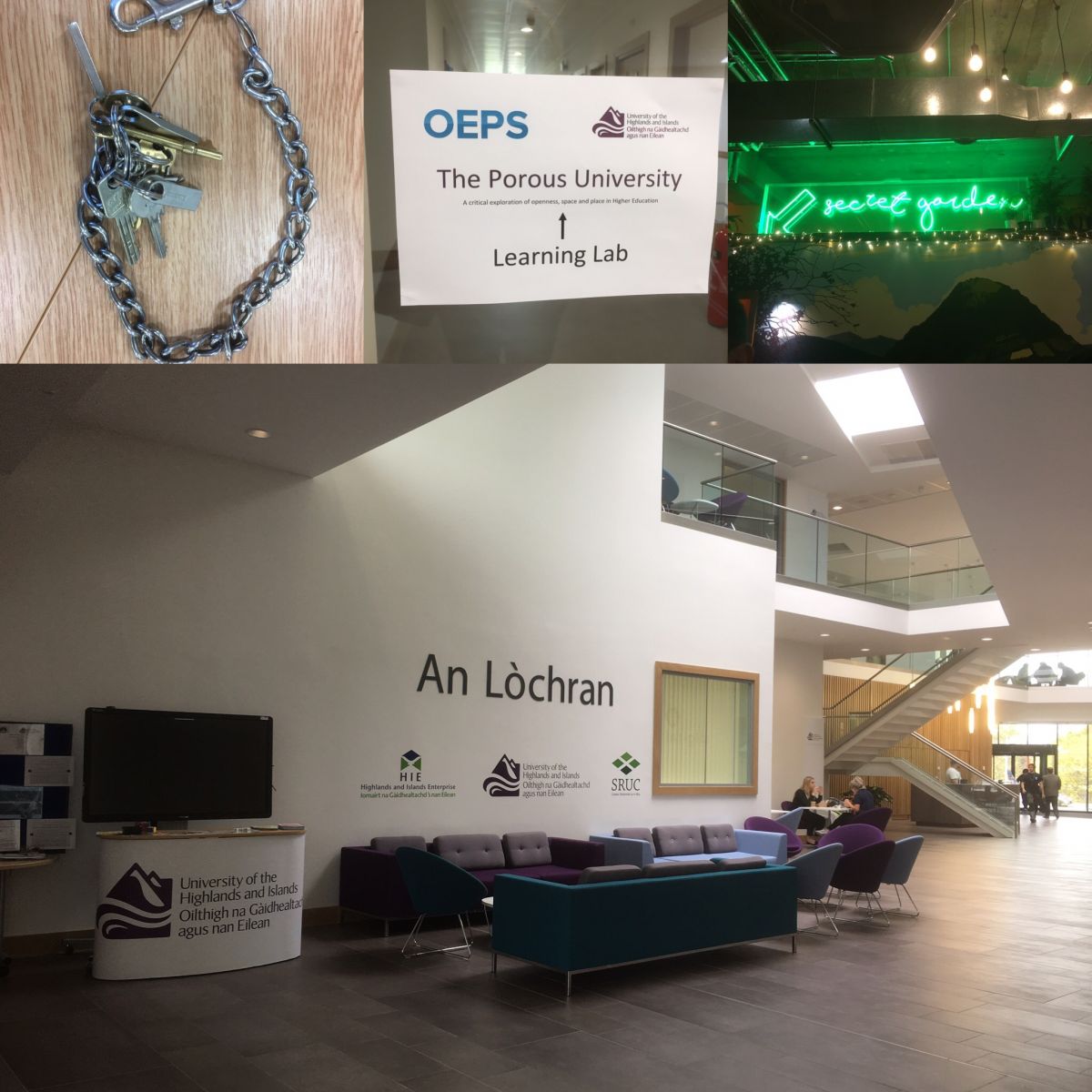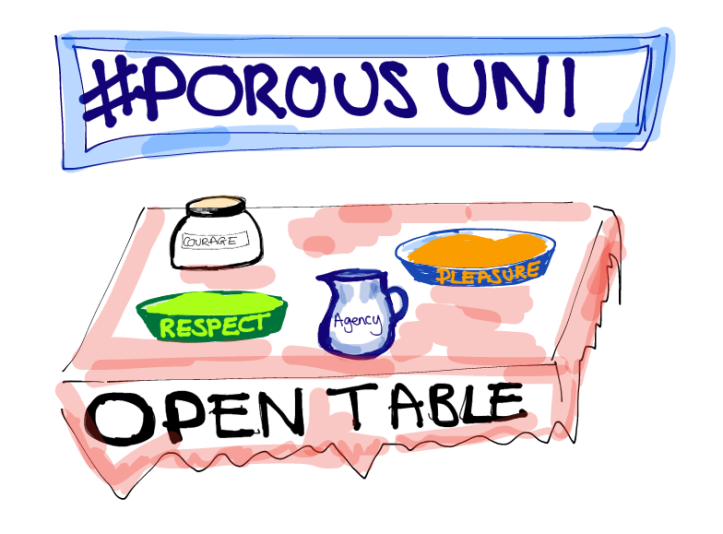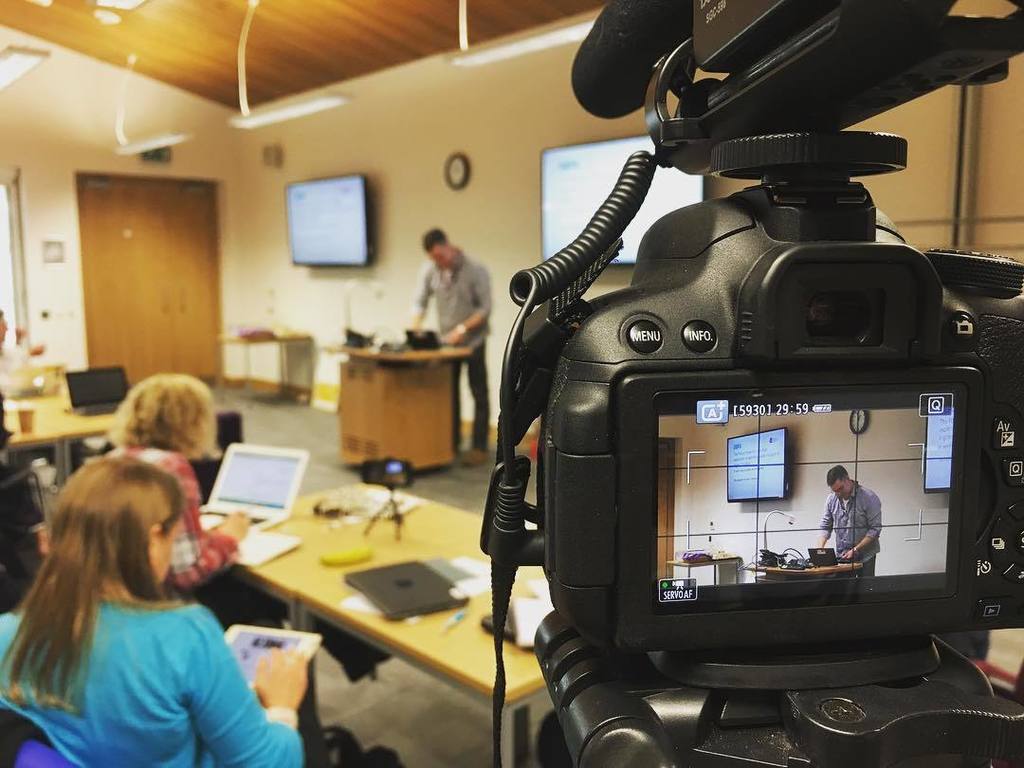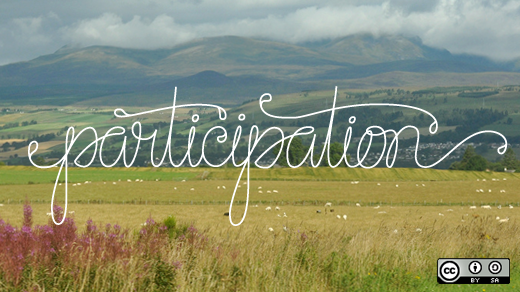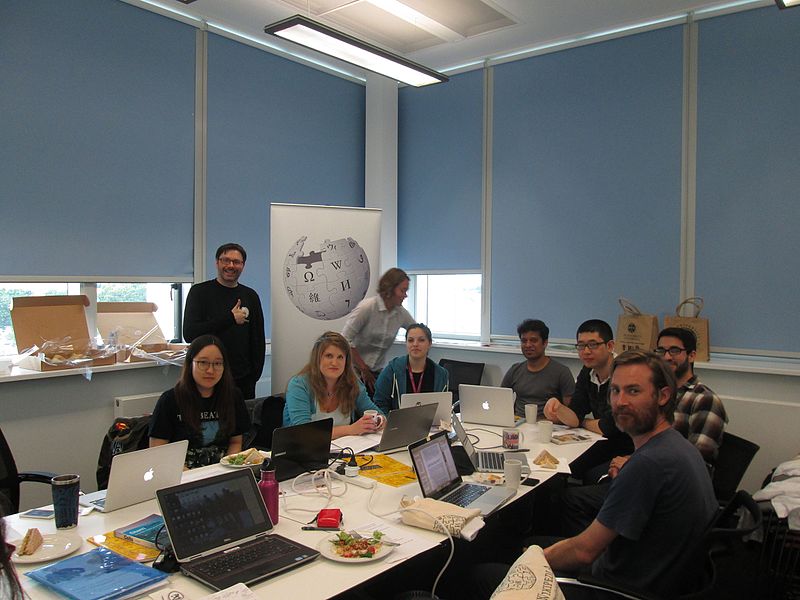Open education approaches, including digital and face-to-face, are an increasingly important means of engagement for the university and an area in which significant developments are underway. Within the UHI context, ‘networked delivery” of courses is particularly important and allows students within rural and geographically dispersed communities to undertake their studies from their own location. For undergraduates, this can mean undertaking their degree programme from home, their nearest campus, or one of UHI’s sixty plus regional study centres, regardless of where within the UHI network their programme is being delivered from. UHI are the largest users of videoconferencing within the Higher Education sector in Europe, and in combination with other online technologies videoconferencing is central to the delivery of UHI’s programmes and providing access to lectures, seminars and other synchronous learning opportunities.
With respect to how the digitally and geographically distributed nature of education at UHI will continue to evolve, both generally and with respect to open education, Keith describes as a key consideration for the university, and the work of the LTA, the question of:
“What the relationship is between our digital spaces and our physical on-campus spaces in relation to both the design and facilitation of teaching and learning but also how UHI might approach the development of its own open educational practices”
Openness at UHI
Many of UHI’s Academic Partners and discipline areas have well established open practices with respect to open learning opportunities within the community, and at a university-wide level various projects and initiatives focused on online open educational practice are underway. This includes an entry level business studies programme begin developed for OERu, a funded cross-institutional project focused on harnessing open educational resources (OER) in producing e-textbooks, and the embedding of open education practices through a three year curriculum redesign initiative focused on research-based learning.
At an institutional level, UHI’s new Learning and Teaching Enhancement Strategy, which was approved in June 2017 and will begin to be implemented from the new academic year, has a strong commitment to develop both staff and student open educational practices and support the creation, use and reuse of open educational resources.
The new Learning and Teaching Enhancement Strategy, which is values based and focused on establishing a ‘common language’ for developing learning and teaching across UHI, articulates a commitment to ‘Harnessing Open Education Approaches’ which is defined as:
“Developing online and other open education practices and approaches to support and enhance learning and teaching, to use, create and share open educational resources, and to widen access to education including within our local communities.”
With respect to how this will be supported in practice, one of the key objectives for the new strategy is to begin implementing, within the academic year 2018/19, “(i) a policy or framework to guide institutional developments in the harnessing and creation of open educational resources, and in the use of online and other open educational opportunities for the purposes of widening access and public engagement”.
UHI is seeking to further develop and embed open education practice through other means of engagement with staff, including the new MEd Digital Pedagogy which has a strong focus on open education and the creation and use of OER, and through their involvement in an open access online journal (collectively run by a cross-institutional editorial team) that supports colleagues to write up and disseminate their educational practice and research.
Other relevant initiatives that are forthcoming include various open online professional development opportunities, for example a cross-institutional open course in educational scholarship that UHI is co-ordinating and which is to be offered in later on 2017, and aligning internal professional recognition opportunities to the creation of OER.
The above examples help point towards the range of contexts within which UHI is coming to view open education practice as relevant and important. As Keith explained:
“For us it (openness) means other things though…where we can easily provide open access for educational opportunities for Continuing Professional Development (CPD) type purposes but also just to serve any general interest in informal learning that people within the wider community have. Part of the reason UHI exists is to provide access to Further, and particularly Higher Education, in a region where there wasn’t a university presence before. But we also have a wider mission around contributing to the social well-being and economic development of the region that we sit within. And for us, how we share knowledge, how we provide opportunities for those in the wider community to access relevant educational opportunities would be a big part of what we might do with OEP going forward.”
Reflecting on the process of developing the new Learning and Teaching Enhancement Strategy, and related initiatives to support the further development of open education practice going forward, Keith noted that senior staff support was vital. Engaging with staff can take a range of different forms and in this instance, part of raising awareness within UHI of the importance of OEP/OER included holding an externally led workshop Thinking about Open in September 2016. Thinking about Open, which was facilitated by OEPS, helped facilitate and open up discussion between key staff at different levels of the organisation with respect to the direction the university might take. Keith described the workshop as “a key catalyst” to the university’s current position and aspirations relating to open education practice, and explained how the combination of the workshop alongside UHI’s involvement on the OEPS Steering Group directly influenced the open education dimensions of the new strategy including the commitment to develop and open education framework for UHI.
Education as a Public Good and the University as Porous
Opening up the institution so that knowledge flows between the community and the university is central to the new Learning and Teaching Enhancement Strategy, but is also a central part of Keith’s own personal understanding of “openness.”
“I think openness means increasing the opportunities for our students and also other learners in the UHI community and the communities where we sit, to be able to access meaningful formal and informal learning opportunities. I think it also means that we look for ways in which the University [and curriculum] can be more open, more porous … and also what leaks out of learning and teaching in terms of the learning artefacts created, the knowledge that’s created and where it goes. I think it’s really important that openness means that the knowledge that our staff have, the knowledge and the learning artefacts that our students have and create and engage with wherever possible have a resonance beyond the university.
I think openness also for me involve a strong commitment to the ethos of Higher Education as a public good…”
In May 2017 the Learning and Teaching Academy at UHI, in partnership with OEPS, hosted a two-day symposium The Porous University – a Critical Exploration of Openness, Space and Place in Higher Education in Inverness which explored via provocations the current state of the academy and Higher Education, and involved educators and practitioners from across the UK. The symposium was intended to provide an opportunity for critical reflection and dialogue, but also a precursor to continuing debate within the sector. Further activities in this area are currently being scoped. In the meantime you can watch a video featuring participants at the event, and read about the symposium, in various blogs that include those by Sheila MacNeill, Derek Jones and Mark Johnson. There is also a Storify of the event available.
Enabling Transformation and Leading by Example
The Learning and Teaching Enhancement Strategy, and specifically the framework for open education that will be developed to support the strategy, is intended to enable ‘openness’ to become embedded in learning and teaching practice at UHI over the long-term, but also to be flexible enough to reflect changing technologies and practices. It will also look to capture evidence of the impact of OEP on staff, students and communities to and build on the “anecdotal” evidence that has been emerging to date. As Keith explains, this is with a mindfulness that although “enthusiasm” and “interest” from staff is growing:
“…Getting staff to engage and getting universities to take forward OEP I think is going to be one of these slow burn issues because it’s quite a shift in thinking and culture and how we approach scholarly practices but also how we approach the design and delivery … of the curriculum.”
Becoming more open in one’s practice also needs to be recognised and embedded more formally. In relation to the embedding of OER within the professional recognition alluded to previously, UHI have recently implemented a professional recognition scheme that is aligned with the Higher Education Academy’s (HEA) UK Professional Standards Framework and the requirements for attaining Fellowship of the HEA. As it is currently implemented, the ALPINE scheme (Accredited Learning, Professional development and Innovation in Education) requires those seeking recognition to submit digital artefacts as part of their supporting evidence. The digital artefacts can comprise educational materials and resources, interactive media, and case studies, for example, with the basic requirement being that that capture or support good practice, and can potentially be reused or repurposed by others. Currently the digital artefacts are submitted to on online toolkit that provides the option to make the resources openly available beyond UHI. Moving forward, the intention is to implement open as the default for the sharing of the digital artefacts that are created or submitted as part of the professional recognition process.
As Keith also explained in relation to the development and recognition of effective learning and teaching practice, whilst there are a range of existing CPD opportunities such as PG Cert and MEd programmes for academics available across the sector, many PG Cert programmes in particular take quite a conventional approach to engaging the academics enrolled on them. So whilst educators on a PG Cert may learn about how technology can be used to facilitate collaboration, or what the benefits of open practice might be, how this is experienced on the programme itself can often be limited with learning and assessment focused around individual activity and contained within the Virtual Learning Environment.
Allowing academics, as learners, to experience what it is like to use technology in collaborative and creative ways, and to reflective meaningfully upon their experiences, remains a key challenge in helping to encourage and build traction around best practice in OEP and TEL. It is something UHI are seeking to address through the new MEd Digital Pedagogy, and through the other online CPD opportunities offered. As Keith noted:
“I think these programmes have to immerse the staff on them in relevant, authentic online learning activities and activities that engage them with collaborative learning, with OEP so that these staff can then make informed decisions about what they do when they support their own students.”
Confidence and “Getting staff into the habit of sharing things online”
Whilst many staff are “curious” about open education at UHI, practice and knowledge of OEP varies across the university. As further support for engaging in open education practice is provided within UHI, one key issue that needs to be addressed – and which is seen as a challenge across the sector – is educator perceptions of their own role:
“We know for example that getting staff to separate who they are and what they do in terms of supporting the students from what they produce is quite difficult. It’s quite a difficult thing for a number of staff to get their heads around. I think there is a natural assumption, because it’s culturally engrained in how Universities have tended to work up until this point that academics are what they produce … what they produce is a key part of their own identity.
And so where we do expect there to be discussions and challenges would be around getting staff to see that actually what they put in place for the students, it’s about the activities they produce, the support they offer not just about the resources that they write and produce. And getting them to see that some of these resources could come from other places and be used legitimately and valuably in what they do will be a challenge in taking some of this forward.”
A related challenge which will need to be addressed in further developing open education practice at UHI, and which again is seen as common to the sector as a whole, is in building educator confidence and mitigating any perceived need for perfectionism:
“The confidence issue is a big one … part of that confidence issue is getting people to realise it’s OK to share things that are imperfect, they don’t have to be producing things to share themselves that are excellent, things can be good enough to other people to repurpose. I think one of the other challenges we have, but its common across the sector, is getting staff to realise what they are do is worth sharing... for them [staff] it’s just what they do.”
As Keith noted, building educator expertise and confidence will involve both providing educators with concrete examples and support but also opportunities for experimenting and developing: “helping them to think more openly, helping them to develop the skill, the mindset to look at their own practice and where that can and should be more open.”
Students as “Digital Public Scholars”
Educating students about the benefits of ‘openness’, and allowing them to contribute to and through open educational practices, is an important aspect of the new Learning and Teaching Enhancement Strategy in addition to other current initiatives at UHI.
Keith described a current project, running over three years, that is supporting staff from across a range of discipline areas, and teaching at various levels of the curriculum, to embed or further enhance research-based learning and teaching within their modules and programmes. A key theme and aspiration within this project is that of supporting and empowering “students as public scholars”, and who undertake investigative and research projects within the curriculum that are designed to produce outcomes that have a direct relevance in addressing a particular issue or need within the wider community, for example for a third sector group, community enterprise, or small business.
Alternatively the idea of the student as public scholar could also extend to them contributing to open knowledge platforms such as Wikipedia, or co-authoring open access publications. Both of these possibilities are also being explored through the research-based learning and teaching project. UHI are also now exploring how the in-house processes of e-textbook publishing that have recently been developed as part of the aforementioned cross-institutional project can be harnessed in digitising and openly sharing undergraduate and postgraduate dissertations, with a focus on supporting the publication and dissemination of those projects for which there is a clear ‘public good’ relevance or value.
This case study was co-authored by Beck Pitt and Keith Smyth
Originally published on 7 August 2017 - 8:57am by Beck Pitt
Resources
- Listen to Keith’s inaugural lecture It’s Third Space, Jim, but not as we know it: universities, community and digital practice
- Find out more about UHI's Learning and Teaching Academy
Image Credits: Porous University by Beck Pitt is licensed CC BY, Moo! by Beck Pitt is licensed CC BY, Open Table by Sheila MacNeill is licensed CC BY-NC-SA (also article image), Big Cam Oot by Jennifer Jones is licensed CC BY-NC and Sharing is Caring by Beck Pitt is licensed CC BY.
